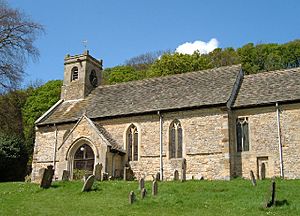Church of Saint Oswald, King and Martyr, Oswaldkirk facts for kids
Quick facts for kids St Oswald's Church, Oswaldkirk |
|
|---|---|

The church, viewed from the south
|
|
| Lua error in Module:Location_map at line 420: attempt to index field 'wikibase' (a nil value). | |
| OS grid reference | SE 620 789 |
| Location | Oswaldkirk, North Yorkshire |
| Country | England |
| Denomination | Church of England |
| History | |
| Status | Parish church |
| Founded | 11th century |
| Dedication | Saint Oswald |
| Architecture | |
| Functional status | Active |
| Heritage designation | Grade II* |
| Designated | 4 January 1955 |
| Architectural type | Church |
| Administration | |
| Parish | Oswaldkirk |
| Deanery | Northern Ryedale |
| Archdeaconry | Cleveland |
| Diocese | Diocese of York |
| Province | Province of York |
The Church of Saint Oswald, King and Martyr is an Anglican church in the village of Oswaldkirk, North Yorkshire, England. It stands on the main road through the village. This historic church is about 1.5 miles (2.4 km) east of Ampleforth Abbey.
The church is named after Saint Oswald, a Christian king. It is more than 900 years old and is part of the Church of England. St Oswald's is one of four churches in a group called a benefice. This group includes churches in Ampleforth, Gilling East, and Stonegrave. The church has been a special Grade II* listed building since 1955. It is the oldest building in Oswaldkirk by many centuries.
Contents
What's in a Name?
The word "kirk" means church. So, "Oswaldkirk" literally means "Oswald's church." The village got its name from this church. The church is dedicated to Saint Oswald. He was a Christian king who lived in the 600s AD. He helped spread Christianity across Northumbria.
A Look at History and Design
Almost all of the first church, which was built on the site of an older wooden Saxon church, is gone. But some unique Celtic stone carvings remain. These include a woven pattern and a carving of the Virgin and Child. This carving was made around the year 1000 AD. The current building still has a special corner stone, called a quoin. It was likely a reused stone from an Anglo-Saxon cross.
Norman Entrance and Medieval Windows
The stone entrance on the south side of the church is still standing. It was built in the 1100s. This entrance is a great example of Norman stonework. The church was officially blessed again in 1287. This was done by a bishop under the direction of the Archbishop of York. The tall windows on both the north and south sides of the main part of the church, called the nave, were added around 1320 to 1330. You can still find small pieces of old medieval glass in the top parts of two of these windows.
Notable People and Ancient Tombs
Inside the southern wall, under a low arch, there is a tombstone placed sideways. People generally believe it belongs to Sir Richard Pickering. He passed away in 1441. His family, the Pickerings, were important in Oswaldkirk from the 1300s to the 1500s.
The church records show a continuous list of rectors (church leaders) going back to 1302. This was during the time of King Edward I. One famous rector was John Dee. He served from 1568 to 1574. Dee was a well-known mathematician, astrologer, and astronomer. He was friends with Queen Elizabeth I and even advised her on the best date for her coronation.
Bells and Sermons
In 1661, John Tillotson preached his first sermon at St Oswald's Church. He later became the Archbishop of Canterbury and a chaplain to King Charles II. He was friends with John Denton, who was the rector of the church at that time.
A very important event in the 1600s was the installation of two new bells. One bell, from 1684, says "Venite Exultemus Domino" in Latin. This means "Come, let us rejoice in the Lord." The other bell, from 1683, says "Gloria in Altissimus Deo." This means "Glory to God in the highest." These bells are still used today. Their ropes go down to the floor next to a clock mechanism from 1898. This clock is fully mechanical and powers two clock faces on the bell tower.
Restoration and Modern Features
Major restoration work was done on the church in 1886. Much of the wooden work in the Chancel (the area around the altar) is from this time. During this restoration, the east window was also replaced. It now shows Saint Oswald with Saint Aidan and Saint Cuthbert on either side. These saints helped Oswald with his missionary work.
The west window, above the font (a basin for baptisms), shows Queen Victoria. Other newer parts of the church include the bell turret and the organ chamber. The south porch is now the main entrance for people attending services. The church uses an electric organ during its services. St Oswald's Church has been a Grade II* listed building since January 4, 1955.
St Oswald's Today
St Oswald's is part of a group of four churches. These include the churches in Oswaldkirk, Ampleforth, Gilling, and Stonegrave. As of 2025, the vicar (the priest in charge) is the Reverend James Trowsdale. He serves all four parishes.
Services happen weekly on Sundays and at other times during the week. Volunteers from the local community help out. Every Christmas Eve, the church hosts a carol service. This service is a joint effort between the Anglican and Roman Catholic groups in Oswaldkirk. The churches also hold a harvest festival each year.
More to Explore
- Grade II* listed buildings in North Yorkshire (district)
- Listed buildings in Oswaldkirk
Gallery
 | Lonnie Johnson |
 | Granville Woods |
 | Lewis Howard Latimer |
 | James West |





